6 Best 'Anxiety Superfoods' To Eat When You're Feeling Stressed
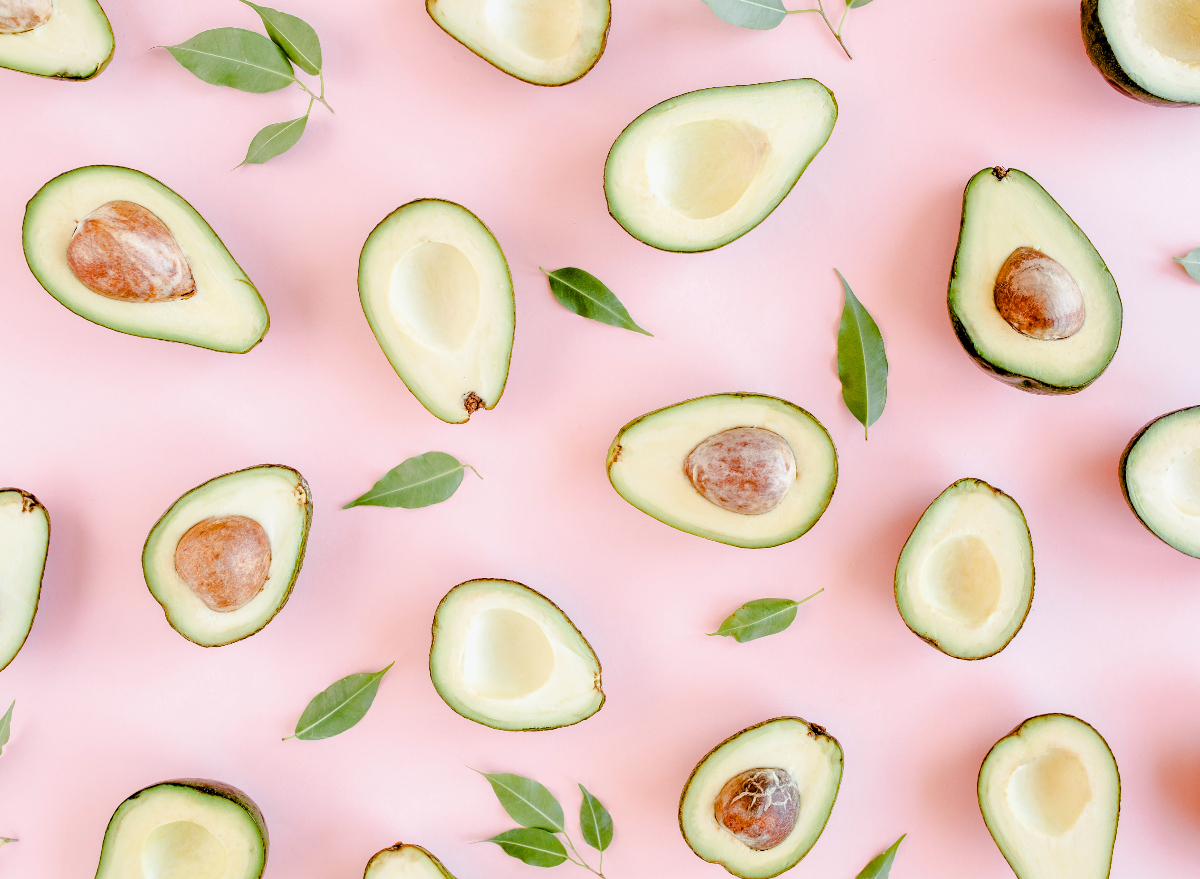
When you're feeling stressed, you may immediately turn to calming methods such as deep breathing, guided meditation, yoga, and even a soothing bubble bath. But did you know that certain foods can also calm your anxiety and help you feel less stressed? That's right! Eat This, Not That! chatted with Dr. Uma Naidoo, a Harvard-trained nutritional psychiatrist, professional chef, nutritional biologist, and author of This is Your Brain on Food and the upcoming Calm Your Mind With Food, who breaks down the best anxiety superfoods to eat when you're stressed.
If you're looking for new ways to effectively manage your stress, anxiety superfoods are an excellent option to explore. Keep reading to learn all about them, and when you're finished, be sure to check out People Are Using This Meditation Trick for Insomnia—and Claim It Works.
What are anxiety superfoods?
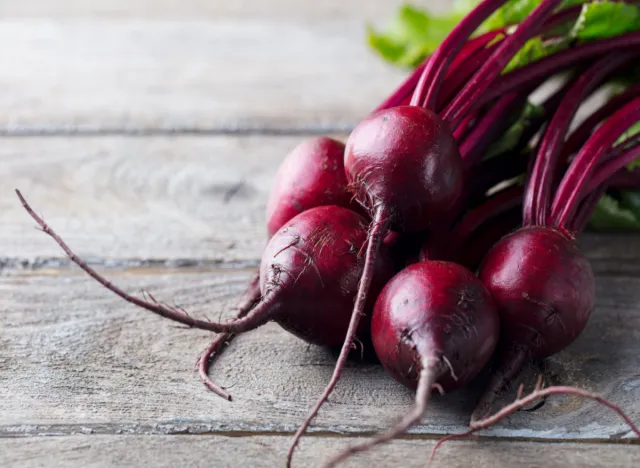
If the name "anxiety superfoods" immediately grabbed your attention, we're right there with you. But what makes a food an "anxiety superfood"? An anxiety superfood is a healthy, nutrient-dense food that contains stress-reducing properties.
There are numerous pathways in the body that play a role in managing stress and anxiety, and certain nutrients you get from foods can affect these mechanisms. For example, gut health is closely tied to mental and brain health through the gut-brain axis, so making sure your gut microbiome is full of good-for-you bacteria may help reduce anxiety. To support microbiome health—and thus manage anxiety—consuming foods that are high in prebiotic fiber and probiotics can help.
Minerals are also important players in anxiety regulation, with iron being one example. "Iron is key to neurotransmitter metabolism in the brain, and iron levels play a role in the availability of serotonin and dopamine [happy hormones] as well as impacting the levels of GABA," says Dr. Naidoo. GABA is a neurotransmitter that produces a calming effect by controlling nerve cell hyperactivity associated with anxiety, according to the Cleveland Clinic.
"Iron is the most common nutritional deficiency in the world," Dr. Naidoo tells us, so it's important to prioritize intake of iron-rich foods to keep anxiety and stress levels low. While red meat is widely presumed to be a good source of iron, "cacao is the best-known plant-based source of iron and also contains three times the iron density of red meat," notes Dr. Naidoo, adding that "Iron from plant sources is a non-heme iron and requires vitamin C for maximum absorption!" So enjoying your dark chocolate with a citrus fruit such as a clementine is a stellar way to maximize your iron.
These are the best anxiety superfoods to reduce stress.
If you're excited to give anxiety superfoods a try, check out Dr. Naidoo's top anxiety superfoods to eat when you're stressed.
1. Green or Black Tea
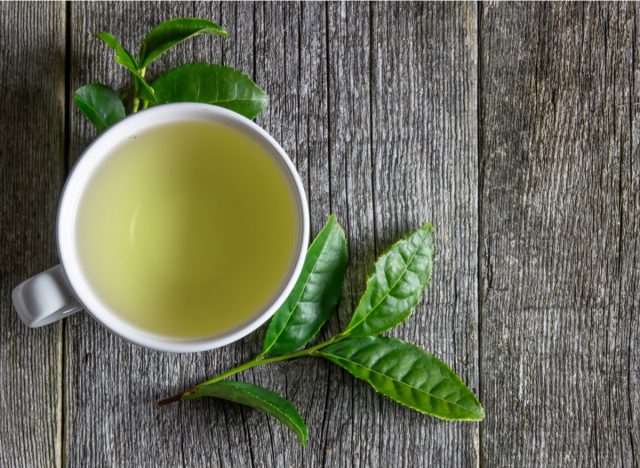
One of Dr. Naidoo's go-to teas to boost brain health and manage anxiety is green tea. "It is incredibly rich in polyphenols and a catechin called epigallocatechin-3-gallate (EGCG). EGCG has powerful anti-inflammatory properties that can reduce the risk of neurodegenerative diseases with age," she tells us. "Green tea is also rich in the amino acid L-theanine, which has been shown to reduce levels of stress and anxiety."
2. Unsweetened Kefir
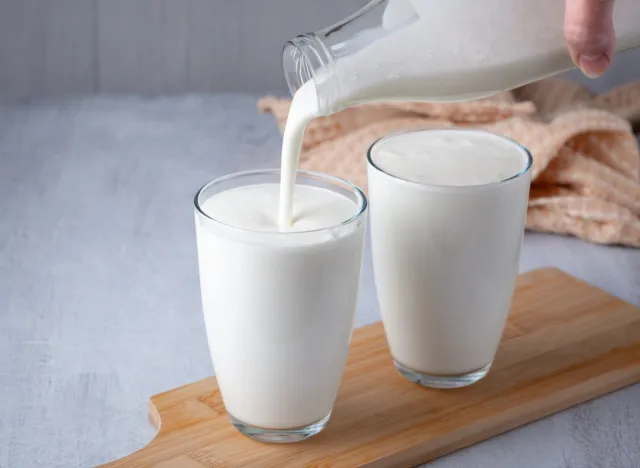
Fermented foods like unsweetened kefir made with whole milk can promote good gut bacteria to grow. This can help decrease inflammation and promote the production of crucial chemicals, such as enzymes, neurotransmitters, and other molecules that the brain requires to function to the best of its ability, Dr. Naidoo explains.
3. Berries
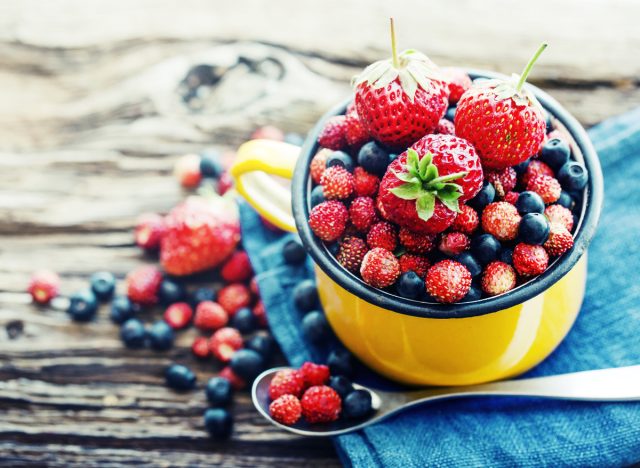
Berries are packed with fiber and natural antioxidants like vitamins C and E. They also offer micronutrients such as calcium, folic acid, selenium, lutein, and alpha and beta carotene, Dr. Naidoo says. Research published in Nutrients discovered that dietary interventions, such as eating blueberries, can be incredibly effective in boosting one's mood and preventing depression.
4. Avocados
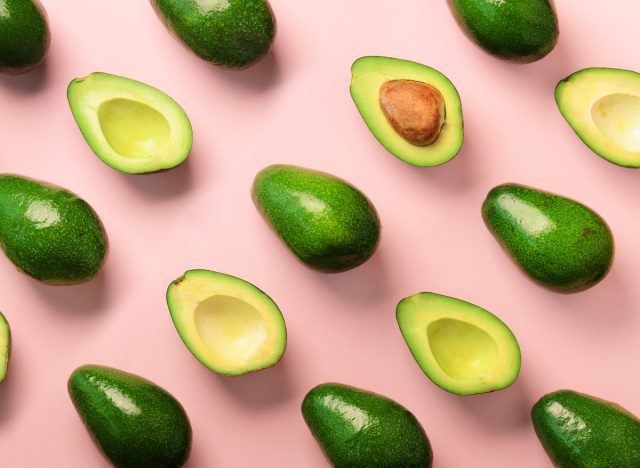
If you didn't already know, avocados are a great source of magnesium. According to the Cleveland Clinic, one whole avocado offers 58 mg of magnesium.
"Magnesium is a mineral in the body that regulates … biochemical reactions in the body, including protein synthesis, muscle, and nerve function," Dr. Naidoo explains. "This mineral helps to regulate many key neurotransmitters involved in mood regulation." Research shows that being deficient in magnesium is also linked to anxiety, fatigue, and irritability. "Adding more [magnesium] to one's diet is also shown to improve quality of sleep, hydration, and muscle growth and recovery—and sleep, nutrition, and physical activity are all closely tied to our mental health, especially symptoms of anxiety and depression."
5. Egg Yolks

Egg yolks are packed with vitamin D; one large egg yolk offers 37 IU of vitamin D. "The research provides clear support for the role of vitamin D in helping symptoms of depression and anxiety," Dr. Naidoo says. "Vitamin D is a fat-soluble vitamin known for its role in calcium absorption, bone growth, mineralization, and remodeling. In the brain, Vitamin D acts as a neuro-steroid and plays a role in protecting against depression and anxiety disorders, and there is a well-established link between vitamin D deficiency and symptoms of depression, as well as worsened anxiety, as the deficiency or excess of vitamin D plays a crucial role in regulating stress responses."
6. Leafy Greens
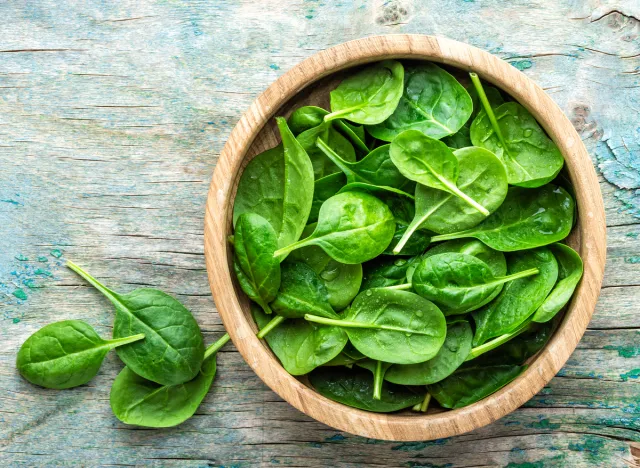
"Leafy greens are an excellent source of fiber and carotenoids and are rich in folate, or vitamin B9," Dr. Naidoo points out. "They also contain vitamins C, K, and calcium. Folate is a nutrient that upholds the function of neurotransmitters, the chemical messengers within our brain governing mood and cognition, including anxiety and stress management." Consider adding leafy greens like spinach and kale to your meal rotation.
And don't toss those beet greens! "Many people throw away beet greens, but they are nutrient-dense, packed with calcium, fiber, and vitamins A and K," Dr. Naidoo tells us. "Turnip greens are more nutrient-dense than the actual turnips! They contain stress-reducing compounds like gluconasturtiin, glucotropaeolin, and myricetin."
- Source: https://www.ncbi.nlm.nih.gov/pmc/articles/PMC5641835/
- Source: https://my.clevelandclinic.org/health/articles/22857-gamma-aminobutyric-acid-gaba
- Source: https://pubmed.ncbi.nlm.nih.gov/31758301/
- Source: https://www.ncbi.nlm.nih.gov/pmc/articles/PMC5331589/
- Source: https://health.clevelandclinic.org/foods-that-are-high-in-magnesium/
- Source: https://www.ncbi.nlm.nih.gov/pmc/articles/PMC7761127/
- Source: https://www.ncbi.nlm.nih.gov/pmc/articles/PMC3703169/
- Source: https://jissn.biomedcentral.com/articles/10.1186/s12970-015-0081-z
- Source: https://fdc.nal.usda.gov/fdc-app.html#/food-details/172184/nutrients
- Source: https://ods.od.nih.gov/factsheets/VitaminD-HealthProfessional/
- Source: https://pubmed.ncbi.nlm.nih.gov/31769259/









